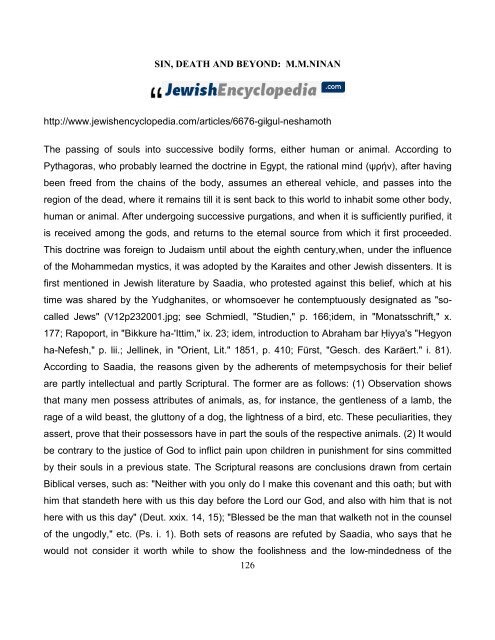Sin death and beyond
Create successful ePaper yourself
Turn your PDF publications into a flip-book with our unique Google optimized e-Paper software.
SIN, DEATH AND BEYOND: M.M.NINAN<br />
http://www.jewishencyclopedia.com/articles/6676-gilgul-neshamoth<br />
The passing of souls into successive bodily forms, either human or animal. According to<br />
Pythagoras, who probably learned the doctrine in Egypt, the rational mind (ψρήν), after having<br />
been freed from the chains of the body, assumes an ethereal vehicle, <strong>and</strong> passes into the<br />
region of the dead, where it remains till it is sent back to this world to inhabit some other body,<br />
human or animal. After undergoing successive purgations, <strong>and</strong> when it is sufficiently purified, it<br />
is received among the gods, <strong>and</strong> returns to the eternal source from which it first proceeded.<br />
This doctrine was foreign to Judaism until about the eighth century,when, under the influence<br />
of the Mohammedan mystics, it was adopted by the Karaites <strong>and</strong> other Jewish dissenters. It is<br />
first mentioned in Jewish literature by Saadia, who protested against this belief, which at his<br />
time was shared by the Yudghanites, or whomsoever he contemptuously designated as "socalled<br />
Jews" (V12p232001.jpg; see Schmiedl, "Studien," p. 166;idem, in "Monatsschrift," x.<br />
177; Rapoport, in "Bikkure ha-'Ittim," ix. 23; idem, introduction to Abraham bar Ḥiyya's "Hegyon<br />
ha-Nefesh," p. lii.; Jellinek, in "Orient, Lit." 1851, p. 410; Fürst, "Gesch. des Karäert." i. 81).<br />
According to Saadia, the reasons given by the adherents of metempsychosis for their belief<br />
are partly intellectual <strong>and</strong> partly Scriptural. The former are as follows: (1) Observation shows<br />
that many men possess attributes of animals, as, for instance, the gentleness of a lamb, the<br />
rage of a wild beast, the gluttony of a dog, the lightness of a bird, etc. These peculiarities, they<br />
assert, prove that their possessors have in part the souls of the respective animals. (2) It would<br />
be contrary to the justice of God to inflict pain upon children in punishment for sins committed<br />
by their souls in a previous state. The Scriptural reasons are conclusions drawn from certain<br />
Biblical verses, such as: "Neither with you only do I make this covenant <strong>and</strong> this oath; but with<br />
him that st<strong>and</strong>eth here with us this day before the Lord our God, <strong>and</strong> also with him that is not<br />
here with us this day" (Deut. xxix. 14, 15); "Blessed be the man that walketh not in the counsel<br />
of the ungodly," etc. (Ps. i. 1). Both sets of reasons are refuted by Saadia, who says that he<br />
would not consider it worth while to show the foolishness <strong>and</strong> the low-mindedness of the<br />
126


















